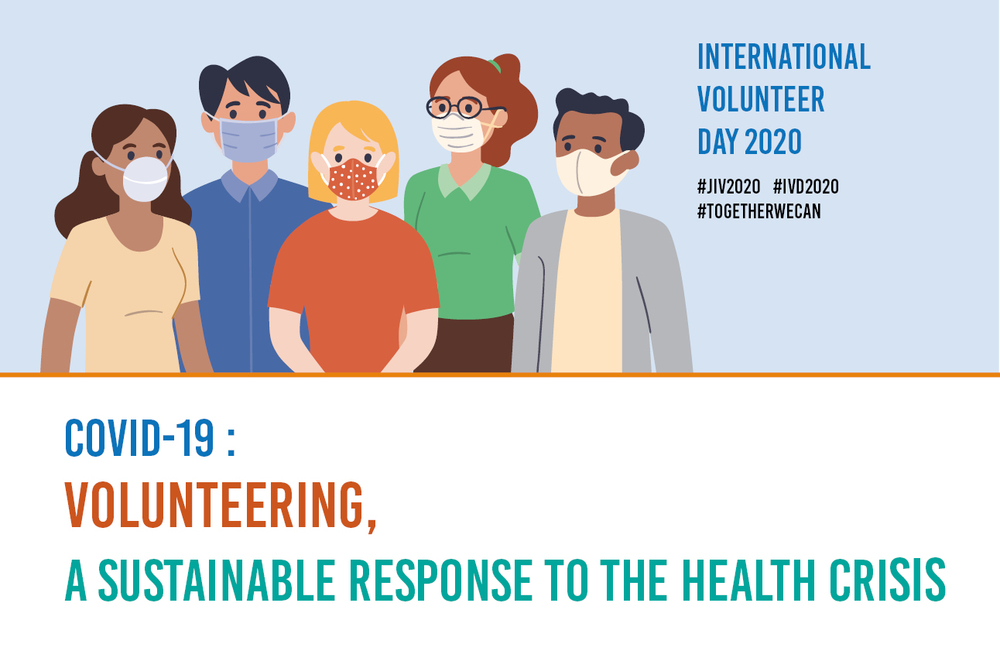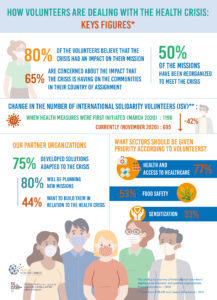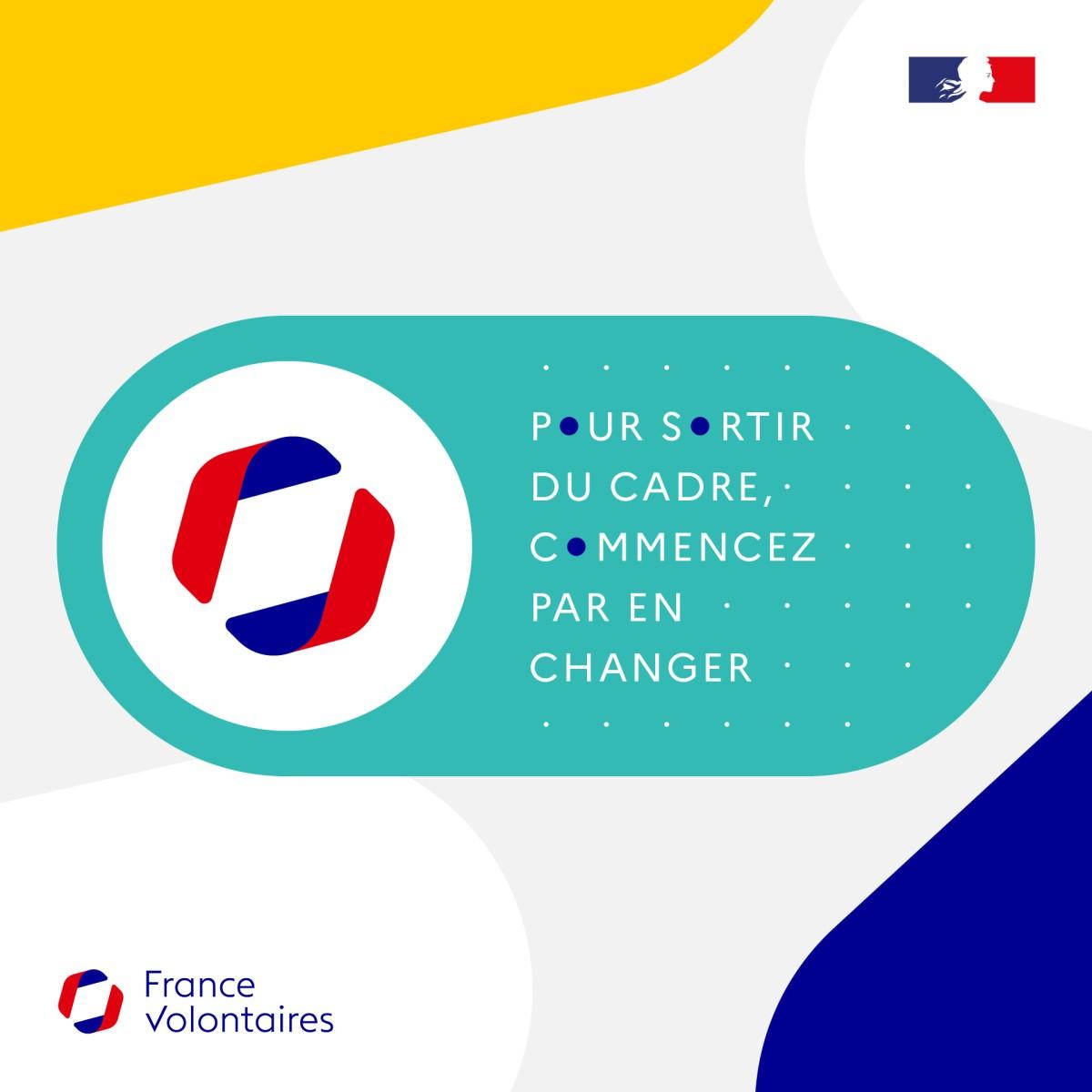COVID-19: Volunteering — a sustainable response to the health crisis

International Volunteer Day
International Volunteer Day (IVD) celebrates volunteering every year, recognizing volunteers’ contributions to the achievement of Sustainable Development Goals (SDGs) at the local, national, and international levels.
This year’s theme, “Together we can through volunteering” celebrates the commitment of volunteers and their impact during this turbulent period of the health crisis. Below is a list of events organized by France Volontaires connected with IVD.
Volunteering gives everyone an opportunity to play a key and positive role in society. In that context, volunteering strengthens solidarity, inclusion, and cohesion, and promotes the values of cooperation and reciprocity.
Volunteers and the health crisis: Key figures from a study by France Volontaires
In order to better assess the impact of the health crisis on volunteers’ missions, France Volontaires launched a broad survey of volunteers and voluntary organizations this past summer. Unsurprisingly, 80% of the volunteers believe that the crisis impacted their mission objectives and performances (36% responded “yes, considerably,” and 43% “yes, a little”). Thirty-four percent of the missions were able to be carried out in person, 55% by working remotely. Only 10% of the missions had to be interrupted or terminated. It is noteworthy that half of the missions were reorganized or redirected in order to explicitly respond to the demands of the health crisis.
Volunteers on the front line
In this survey, 65% of the volunteers indicated that they were particularly concerned about the impact of the crisis on the communities in their country of assignment.
Within the framework of their mission, and sometimes also their personal time, many of them were actively involved in responding to the health crisis: distributing food and sanitary kits, raising awareness, coordinating projects, etc. Among multiple initiatives, we can mention:
- In Tunisia, ten civic service volunteers (from Club Culturel Ali Belhouane, sent by Cieux de Mahdia, and from the Commissariat régional de la jeunesse de Mahdia, sent by the French department of Loire-Atlantique) mobilized for the regional campaign to collect donations in Tunis and Mahdia, as part of the fight against the spread of COVID-19, and also got involved in matters related to raising general public awareness of sanitary, health, and social distancing measures.
- In Cambodia, the volunteers chose to express themselves in Khmer, the language of their host country, in their video spot to raise awareness of the protective guidelines. See the video
- In Peru, at the initiative of France Volontaires, French and Peruvian volunteers also participated in an awareness-raising campaign on social networks, called “I’m staying at home.” See the Facebook page
- In Vietnam, two international solidarity volunteers, trained psychologists from Ecole des psychologues praticiens, are hosting an online psychological support unit for other volunteers based in Asia. Read the dedicated news
- In Brazil, thanks to the funds raised by Fidesco, some food supplies and sanitary kits were distributed to 130 young mothers and their families, thanks to support from the project “Sonho de Mae” (“Mom’s dreams”). Working as the project coordinator alongside two other Fidesco volunteers, Mathilde coaches these young women (under 22 years old), listens to them attentively, coordinates the training they receive, and oversees the logistics of the association. Due to the pandemic, the association has adapted its missions to meet the needs of these highly vulnerable young mothers.
As well as the video testimonials of:
- Raphaël, international solidarity volunteer and Director of Samusocial Pointe-Noire in the Congo;
- Sabine, an international solidarity volunteer in Lebanon, has initiated a project on behalf of a group of women from Sierra Leone who are abuse victims.
- Alice is a VIS with the French Red Cross in the Comoros;
- Séverine and Diana, civic service volunteers in Vanuatu, are now working with the French Red Cross in New Caledonia.
In addition, volunteers have had the opportunity to be directly involved in solidarity projects recently initiated or amplified by the crisis. Fifty-nine percent of them say that they have witnessed new or existing forms of solidarity revealed during the crisis, or marked by a change in scale: 57% at the initiative of, or organized by, the citizens themselves, and 53% by local associations, or within the communities. More than one-third of volunteers were able to participate in them.
Strengthened cooperation between stakeholders
In dealing with the health crisis, volunteer organizations combined their forces, often producing coordinated responses. One figure attests to it: 75% of the organizations surveyed affirm that they worked with other stakeholders to develop appropriate responses for dealing with the crisis (38% responded “Yes, totally,” and 37% “Yes, somewhat”). Seventy-nine percent of them believe that this collaboration translated into the sharing of information on local conditions, and 45% also responded that this collaboration gave rise to the implementation of joint projects. Following are some examples:
- In the Congo-Brazzaville, France Volontaires collaborated with the United Nations Volunteers (UNV) program and the Réseau des Acteurs du Volontariat et de la Solidarité Internationale (RAVSI) to launch a project that would be part of the national plan to combat COVID. The “Mask4all” project combines training, mask distribution, and awareness-raising. Ten seamstresses were trained, and no less than 1,200 masks manufactured, which were given to 1,200 inhabitants of Brazzaville.
- In Cameroon, “All against COVID-19” is a collaborative project between France Volontaires, the French Embassy in Cameroon, United Nations Volunteers, and the Réseau des acteurs du volontariat et de la solidarité internationale (RAVSI Cameroun), centered around training, sensitization, and the distribution of sanitary kits in the 4 areas in which RAVSI operates. The results are already in: RAVSI’s 80 associations have been trained in COVID-19 prevention measures, and are now prepared to able to contribute to the ongoing COVID monitoring service, 5,000 people have been made aware of the protective guidelines, 5,000 vulnerable people have received reusable masks, and 100 families have benefited from having access to water buckets with a tap.
- In Burkina Faso, France Volontaires has funded a national volunteer’s mission on behalf of Burkina Faso’s National Volunteer Program. What was this volunteer’s assignment? To assist in the communications effort in the fight against COVID-19, and, most notably, with volunteers’ initiatives.
- In Guinea, too, France Volontaires has participated in the activities of the Stop COVID-19 platform. The aim of the latter, consisting of 42 organizations (NGOs, associations, and groups), is to raise awareness among Conakry’s populations. France Volontaires thus funded a national volunteer’s mission to coordinate the platform, and also mobilized two European volunteers of projet AVENIR to work with its training and organization components in order to strengthen the capacity-building of the platform’s organizations.
- In Togo, projet AVENIR stakeholders have also reorganized their activities to focus more directly on responding to the health crisis: food and sanitary kit distribution, awareness-raising, and training initiatives, etc. In all, 2,500 households took advantage of the sanitary kit and/or food distributions, 300 people took part in training activities, and over 3,000 people were sensitized to follow protective guidelines. To learn more
Projet AVENIR – Action des volontaires européens et nationaux investis pour la résilience (Action by European and National Volunteers for Resilience) is a project funded by the European Union, supervised by France Volontaires. - In Chad, several initiatives have been undertaken with the former national volunteers’ network. One of them was a distribution of hydroalcoholic gel and masks for baccalaureate candidates of the largest high school in N’Djamena. To compensate for a lack of resources that would allow the young students to pass the tests according to protective guidelines, France Volontaires Chad and the United Nations Volunteers program collaborated to provide 2,000 masks and hydroalcoholic gel to students, school monitors and police officers entering the building. UNV and RAVN program volunteers participated in this distribution.
Volunteering: A sustainable response to the health crisis and its consequences
Sixty-four percent of the volunteers believe that volunteering is an appropriate response to the crisis, particularly if the stakeholders are well-prepared and the volunteers skilled in crisis management, provided that that they differentiate between humanitarian and volunteer efforts, while making them mutually supportive.
Over the longer term, they feel that the priority areas for action to be invested in terms of strengthening resilience capacities to deal with this crisis, are: the health system and access to healthcare (77%), food safety (53%), and sensitization (33%), but also the development of local agriculture and community organization.
The same response applied to organizations: nearly 80% (78% are thinking of planning them, 19% of them “Don’t know,” but are planning new missions, and 48% of them would like to build them in connection with the health crisis. Early in 2021, France Volontaires will present a full analytical report on its volunteer sector consultation process concerning the impacts of the crisis and the lessons that can be drawn from the adaptations and changes observed in terms of partnership development, technology solutions that need to be found, articulation between different types of commitments, and new forms of solidarity. The platform will thus be able, in cooperation with its members and partners, to adapt its responses to future crisis situations and enhance its actions for developing greater international civic engagement.
For the time being, the gradual resumption of volunteer deployment is giving new momentum to committed stakeholders and some perspective to men and women who want to commit themselves to carrying out missions of solidarity and responsibility.
To learn more:
Some volunteer testimonials about how they dealt with the health crisis:
- Three civic service volunteers deployed by La Guilde: Meïlie in Cambodia, Wendy in Ecuador and Louise in the Philippines, who pursued their activities despite the lockdown;
- Watch a testimonial video from Louise, a civic service volunteer deployed by The European Guild, at the Alliance française of Buenos Aires in Argentine;
- Corentin, an international solidarity volunteer in Brazzaville, sent by the Catholic Delegation for Cooperation to work with a center taking in street children.
Also read : “Crise sanitaire : France Volontaires et son réseau international pleinement mobilisés”
Contact:
[email protected]
Lucie MORILLON, head of Research, Communications and Advocacy : [email protected] – 06 75 86 99 70




